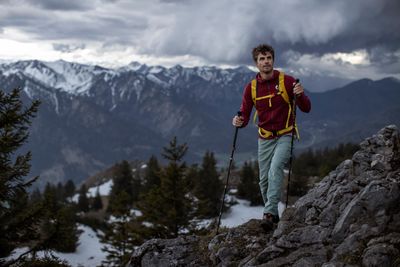Contents
Trekking poles - practical or unnecessary?
Hiking and trekking poles are becoming increasingly popular. Whereas in the past they were rather ridiculed for their use, nowadays more and more hikers rely on the support of these functional helpers. But the use of poles is not always really helpful. We show you the advantages of hiking poles, where they are best used and why it is sometimes better to go without them.
Pro: Reduced strain and more stability

The advantages of trekking poles are obvious. They reduce strain on your joints, especially the knees and the spine, as they distribute the weight between the arms and legs. This also puts less strain on the leg muscles. For hikers with joint or spinal problems, walking poles are a great way to make the journey easier. They also provide additional impetus when walking uphill.
Another aspect is the increased stability and safety due to additional contact points, which ensure better balance and posture. Especially when carrying heavier loads, for example in the form of a fully packed backpack, this makes a big difference on longer distances. On slippery or uneven ground, trekking poles provide better grip and increased steadiness, making it easier to tackle more difficult routes.
Contra: Risk of injury and reduced sense of balance
But this is exactly where the catch lies. If the poles get stuck, slip on rocky ground or loosened telescopic segments suddenly push together, the hoped-for grip may prove treacherous, and instead, the danger of falling and injury may even increase. So you should never rely completely on the poles, and always make sure you have a firm footing as well.
This leads us directly to the next disadvantage of trekking poles. Regular or even excessive use can lead to a deterioration of your balance and coordination. However, it is precisely these skills that are quite important when hiking in the countryside. If coordination skills are lacking, this can lead to insecurity in difficult terrain where the use of poles is not possible.
Das führt uns direkt zum nächsten Nachteil von Wanderstöcken. Der regelmäßige oder gar übermäßige Gebrauch kann dazu führen, dass sich das eigene Gleichgewicht und die Koordination verschlechtern. Gerade diese Fähigkeiten sind bei Wanderungen im Gelände jedoch durchaus wichtig. If coordination skills are lacking, this can lead to instability on difficult terrains where the use of poles is not possible.
In particularly impassable places where the hands have to be used, trekking poles quickly become bulky and annoying. For people who are already insecure, poles can also be an additional overload, as they not only have to think about where to take each step, but also where to poke the pole.
| Pro | Contra |
| - Relief of joints - Support of leg muscles - Additional drive uphill - Increased stability and safety due to additional contact points - Better steadiness on slippery or uneven ground |
- Deterioration of sense of balance - Increased risk of falling and injury - Deterioration of coordination skills - Bulkiness of trekking poles - Additional incertitude on the trail |
Where and for whom are trekking poles worthwhile?

On day hikes or in rough or difficult terrain, the use of poles can be a great help. They support weight distribution and prevent fatigue, especially on longer routes, as the body is more evenly loaded and carrying the backpack becomes more comfortable.
On easy and flat routes, however, you should avoid using poles. This way you can train your sense of balance and give your body the opportunity to move on more challenging terrain without poles.
- balance or coordination deteriorate with age
- joint problems are already present
- undertaking long tours or facing difficult terrain
- carrying heavy backpacks
- more support and stability is required
>> Here you can find a large selection of hiking and trekking poles!
So, do you need trekking poles? Yes and no!
Ultimately, there is no clear yes or no to trekking poles. Whether it makes sense to use them depends on your physical condition and the terrain. If you use your poles specifically on demanding routes, you can relieve the strain on your body. However, excessive use tends to have the opposite effect. That's why you should leave your walking poles at home for easy tours, or at least stow them away in your backpack. As is so often the case, you need to find the golden middle.





